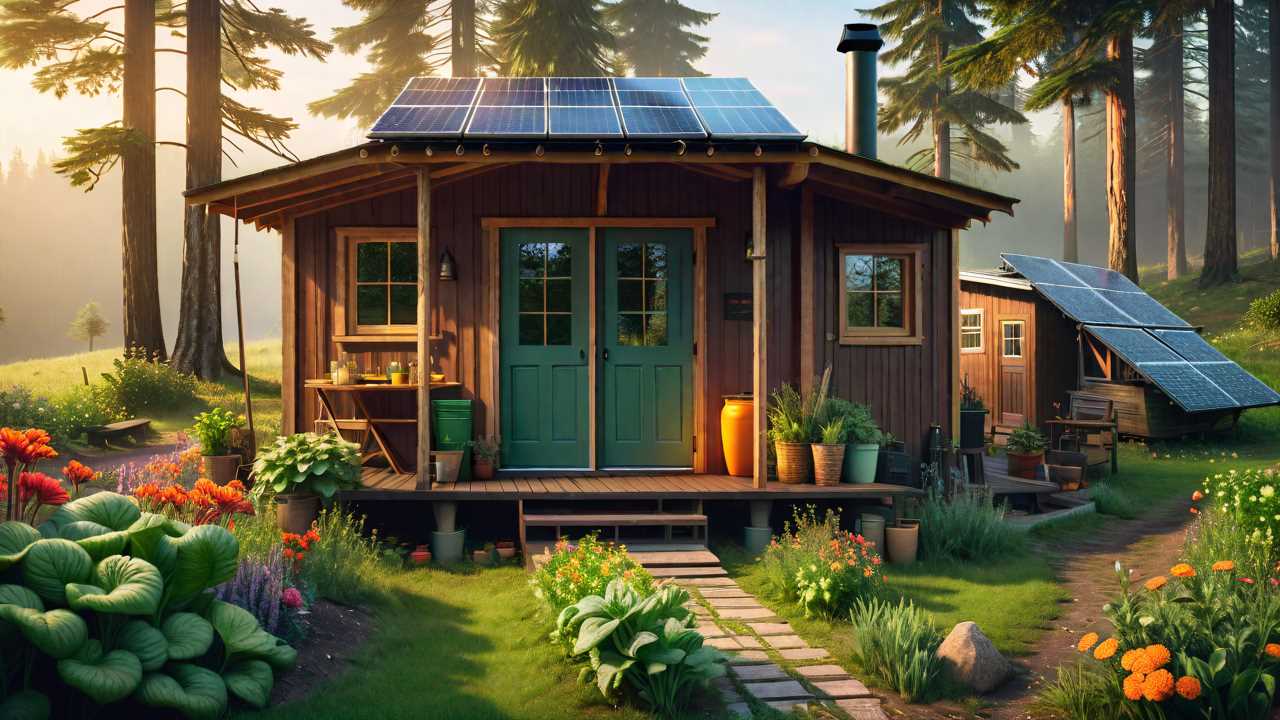
Imagine your off-grid lifestyle as a puzzle, each essential piece fitting together to create a self-sustaining haven. From harnessing the sun's energy to mastering vital survival skills, the path to off-grid living is paved with necessary components. But what about the finer details? How do you guarantee your off-grid sanctuary is truly equipped for the challenges ahead? Let's investigate the intricate web of essentials that will not only support your off-grid lifestyle but also empower you to thrive in the midst of nature's embrace.
Sustainable Energy Sources
When living off-grid, harnessing sustainable energy sources like solar panels and wind turbines is crucial for meeting your power needs efficiently. Solar panels are a reliable option for generating electricity during the day, especially when sunlight is abundant. Make sure you install them in a location with maximum sun exposure to optimize their effectiveness. Additionally, consider using batteries to store excess energy for use during cloudy days or at night.
Wind turbines are another valuable resource for off-grid living, particularly in areas with consistent wind patterns. Before installation, assess the average wind speed in your location to determine the most suitable turbine size. Keep in mind that taller towers can capture stronger winds, generating more electricity.
To make the most of these sustainable energy sources, invest in quality equipment and perform regular maintenance to ensure peak performance. Monitoring your energy production and consumption will help you adjust your usage habits and maximize efficiency.
Water Supply Systems
Efficient water supply systems are essential for off-grid living, ensuring a reliable source of clean water for your daily needs. When living off-grid, you must consider sustainable ways to source, store, and manage your water supply.
Rainwater harvesting is a vital solution that involves collecting rainwater from your roof and storing it in tanks for later use. Installing a filtration system is important to guarantee the water collected is safe for consumption. Additionally, drilling a well can provide a consistent groundwater supply, but it requires professional expertise for installation and maintenance.
To conserve water, consider implementing a greywater system that recycles water from sinks, showers, and laundry for non-potable uses like irrigation. Monitoring your water usage and fixing leaks promptly are essential practices for sustainable off-grid living.
It's also wise to have a backup plan, such as storing extra water or knowing nearby natural water sources for emergencies. By designing a comprehensive water supply system, you can ensure a continuous and reliable water source for your off-grid lifestyle.
Food Storage Solutions
Developing effective food storage solutions is essential for maintaining a sustainable off-grid lifestyle. When living off-grid, making sure you have a reliable system to store food is vital for long-term self-sufficiency. Start by investing in sturdy containers such as mason jars, metal bins, or food-grade buckets to protect your supplies from pests and moisture. Utilize a cool, dark, and dry storage area to prolong the shelf life of dry goods like grains, legumes, and dehydrated foods.
Consider preserving food through methods like canning, fermenting, or dehydrating to extend their freshness without relying on refrigeration. Rotating your stock regularly ensures that older items are used first, preventing waste and keeping your supplies fresh.
Additionally, having a well-organized inventory system helps you keep track of what you have and what needs to be replenished.
Essential Off-Grid Skills
Mastering essential off-grid skills is important for self-sufficiency and resilience in a remote living environment. When living off-grid, you must be prepared to handle various tasks independently.
One essential skill is water sourcing and purification. Knowing how to find, collect, and purify water from natural sources like streams or rainwater guarantees a sustainable water supply.
Additionally, proficiency in basic first aid is indispensable. Understanding how to treat common injuries, identify illnesses, and administer CPR can be life-saving when medical help is far away.
Being able to grow your food is another fundamental skill. Learning about crop rotation, soil health, and seasonal planting is key to maintaining a successful off-grid garden.
Carpentry skills are also valuable for building and repairing structures such as shelters, furniture, and fences using available resources.
Furthermore, basic electrical knowledge allows you to set up and maintain solar power systems efficiently.
Frequently Asked Questions
How Can I Stay Connected Off-Grid?
In the digital wilderness of off-grid living, staying connected is like finding a hidden trail. Seek satellite internet, solar-powered chargers, and two-way radios for reliable communication. Prioritize connections that bridge your isolation.
What Are the Best Off-Grid Communication Options?
When off the grid, prioritize communication options like satellite phones or devices, two-way radios, and even CB radios for reliable connections. Stay prepared with solar chargers and spare batteries to guarantee continuous communication capability.
Are There Off-Grid Waste Management Solutions?
Managing waste off-grid can be challenging yet rewarding. Consider composting for organic waste, using a septic system for sewage, and recycling where possible. Proper waste management is essential for sustainability in off-grid living.
How Do I Handle Medical Emergencies Off-Grid?
In case of medical emergencies off-grid, prioritize safety. Keep a well-stocked first aid kit, know basic first aid procedures, and have communication devices like satellite phones. Consider taking wilderness first aid courses for added preparedness.
What Are the Legal Considerations for Off-Grid Living?
When living off-grid, legal considerations are essential. Make sure to comply with zoning laws, property rights, and building codes. Obtain necessary permits. Consult legal experts for advice on contracts, water rights, and potential disputes. Stay informed and proactive.
 SportsHollywoodLifestyleFashionHome & GardenTrendsPrivacy PolicyTerms And Conditions
SportsHollywoodLifestyleFashionHome & GardenTrendsPrivacy PolicyTerms And Conditions
